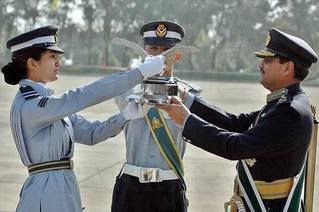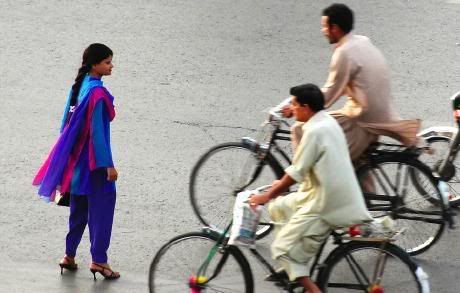Mehr Un Nisa
As much as I’m proud of my culture, the unnecessarily sharp lines drawn between the roles of men and women, is something I can never imagine myself defending. And no matter how liberal an environment you’re living in, the distinction keeps on surfacing in ways that are almost imperceptible.
Petty example: Have you ever noticed how the Director Security at every big event or conference is invariably a male? “Come on, it IS a guy’s job – you can’t make a fuss about that now”, if these aren’t the first words coming to your mind after reading the example, we’re friends.
A more interesting observation that says much about the status of technical training in Pakistan as well as where we stand with respect to the progressive ideals we claim to have is the following: we have absolutely no professional female maintenance workers in Pakistan. It is not unusual for a girl to be kicked out of her room where repair work is to be done, with this innocuous statement, “Baji, aadmi aye hain kaam kernay.”
It leaves you wondering whether the idea of a female plumber, electrician or a carpenter is really as ridiculous as some people would have you believe? What is it in wiring some circuits, basic plumbing or fixing a cable that requires a man’s strength? Women do these jobs in so many countries in the world, after all.
So, why not in Pakistan? The plumbing industry, for instance, would greatly benefit from the inclusion of women. Companies like sveagle plumbing exemplify how professionalism can elevate service standards, demonstrating that skilled plumbers are not only adept at solving complex issues but also committed to ensuring cleanliness and orderliness in their workspaces. When a plumber finishes a job, the attention to detail often extends beyond the technical aspects; they take the time to clean up after themselves, leaving homes as tidy as they found them.
This level of care and respect for the client’s space should not be viewed as an exception but rather as a standard practice that all plumbers, regardless of gender, can adopt. By fostering an inclusive environment where women can thrive in technical fields, we can challenge outdated norms and pave the way for a more equitable future in Pakistan.
There is the inevitable question of whether our society is ‘ready’ for it or not. As far as I have observed, the educated elite has always been appreciative of measures aimed at women’s independence and empowerment. But of course, the educated elite cannot be taken as an accurate representation of the majority of the population, so let’s look at the villages.
But there in the Pakistani villages, as opposed to the picture painted by your fifth grade Urdu textbook, you see women working in the heat of fields as well as brick-kilns and even as road-side vendors. The word ‘mazdoor’ has no gender in these places.
It’s mainly in the urban middle-class and in feudal systems where men feel this need to assert their masculinity and subdue women in face of the ‘corrupting influences’ of modernity. Unfortunately, the number of people
with the regressive mind-set that needs to be challenged is huge. The challenge to these regressive forces, therefore, has to be well-organized, government-enforced and focus on changes within Pakistan’s technical education system.
The government could establish vocational training institutes where women along with men are especially educated to work as mechanics, electricians, rescue workers, plumbers etc. Such a place would actually be an excellent respite for the poor who cannot afford to pursue academics but definitely want to learn a skill that could earn them money and run their households.
Moreover, the notion of being formally trained or educated would add to the self-esteem these women (and men); and in general this may be a step towards giving the blue-collar workers the respect that they deserve in our society. Also, the presence of female industrial workers could actually take us a long way establishing ourselves a progressive society, by forcing people to change their attitudes. And who knows, the enhanced work-force could even be an incentive for the government to move towards developing indigenous technology and cut down on our habit of importing every little pin that the country needs.
My views may sound very idealistic and may even be flawed at more places than one. But one thing I’m sure of is that inducting a few female pilots, paratroopers and traffic wardens in this country’s elite institutions while good, is not enough. Women empowerment in the poor working-class still needs to see the light of the day. Change – in order to carry any meaning at all – must seep into the masses.
























































Love the pictures you have with this post. People, wake up. Women are already doing everything!!!! Without women there would be no agriculture in Pakistan.
I agree totally. It is not about the job. It is about the stereotype. What is showing all over the comments is just how judgemental even the readers here are. The idea that some jobs are for men and some for women is itself the prejudice that this is all about.
Plumbering forheaven sake since when did this come into females job??i mean its not restricted for woman to step aside from those works but les females do progress into those jobs where they are out classing the males.I have been through many institutes and now in this professional life ,not at a single point i saw any male defeating these females but again its not a comparision ..i mean why would females be wanting to get into such petty jobs..??
Dittos.
From the post to the responses.
I will only add this, there is a long way to go for women’s rights; everywhere. The game is not equal. On the other hand, as pointed out, there is a degree of difference in between men and women and a natural alignment. But then, no one should be barred from any work or education, s/he wants to strive.
But in case of Pakistan, as in almost all countries of the world save a few, even ** men** do not have rights. All men are not equal.
Which brings us back to equity and justice, for all!
Another article by someone who thinks a woman’s work is or must be outside the home for her to be “equal” in society. Please.
I dont know many girls in Toronto highschools who want to go to trade school and similarly not many men want to work with disabled children or in early childhood education.
Does that say something about the very nature of men and women? Yah. They are not the same so maybe we should not expect the ratios to always be equal.
However if a girl wanted to be a plumber, I dont see any reason why she should not be encouraged to learn that skill set – its not a bad idea actually as they are usually self employed, you wont have to worry about sexual harrassment or discrimination in the work place because there isn’t any!